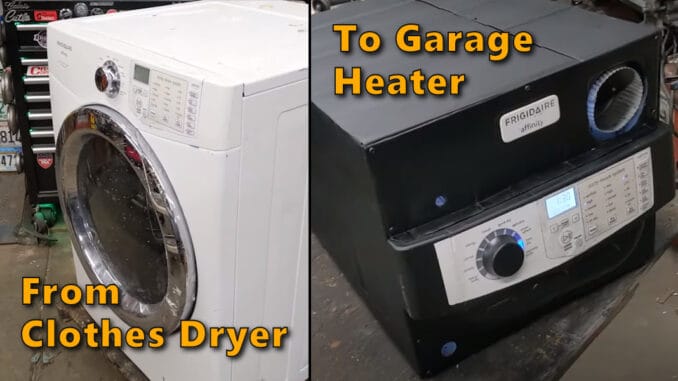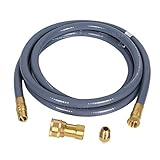
YouTuber sixtyfiveford crafts a shop furnace or garage heater from a curbside freebie natural gas clothes dryer and explains how to do the same with an electric dryer with just a little time and effort.
Editor’s Note: This DIY gas dryer to heater video was originally posted February 16, 2021. An electric DIY dryer to heater build published December 6, 2021 appears below…
Gas Clothes Dryer to DIY Garage Heater
Which Dryer Should You Grab?
- Ones with broken timer controls — You don’t really need the timer knob to work. You would just set it and it would go until you stopped it.
- Noisy/banging drum — you are going to take that all out.
- No spin but the fan still blows — likely the belt is just broken and that’s no problem here.
- Heats but clothes take forever to dry — it is likely just lint plugging everything up.
Which Dryer Should You Leave Behind?
- No heat. This is very common with electric and it’s just the coil 99% of the time. This is generally $20-40 for the new part. With gas dryers, it’s likely the solenoid valves which also cost around $20-40.
- BAD CPU computer board with error code: Not worth messing with.
A note about using electric dryers
- Electric put out around 20k BTU at 5500 watts 240 volts
Some designs are going to be very difficult. The ones with the heating element at the back of the drum will not be easy or near impossible.
The Kenmore/Whirlpool units with the cube heating element on the back should be pretty straightforward to work with. The easiest ones would be the ones with the heating element in the burn tube (old Maytags, for example). See an electric dryer to garage heater build below.
Parts used/mentioned in video:
Super flexible natural gas hose w/coupler
Shop furnace ready-made, ready to install
Heating Costs for Various Energy Sources
The estimated costs to occasionally heat a shop with different sources of energy were calculated for 25 million BTUs (1/4 the amount needed to heat an entire home for the winter in Northern USA):
- ELECTRIC: $953 (rate $0.13kw)
- DIESEL (fuel oil #2): $451 (rate $2.50 gallon) ~ February 2021
- DIESEL (fuel oil #2): $631 (rate $3.50 gallon) ~ December 2021
- KEROSENE (fuel oil #1): $463 (rate $2.50 gallon)
- NATURAL GAS: $200 (rate $0.80 therm)
- PROPANE LPG: $753 (rate $2.75 gallon)
- WOOD PELLETS: $500 (rate $5 per 40# bag)
- WOOD: Free or $406 (rate $250 4x4x8 cord) or $162 (rate $100 4x4x8 cord)
To heat my shop with electricity it would cost around $1,000 vs the $200 for Natural Gas. Currently, I use Diesel which is cheaper and has more BTU per gallon energy than Kerosene. I try to get diesel around $2/gallon and stock up, but prices are going up. At that rate, I could spend around $400-$500 a winter.
The cost for me to run black pipe to my garage was around $35 and took an hour or two of my time. The Flexible hose and coupler were around $40. The Natural gas setup and heater should pay for itself in a few months and if I find it’s not big enough to handle the insulated garage, I will buy the Mr. Heater 50k BTU unit.
Carbon monoxide is not a worry of mine. I have run the torpedo heaters for years and never set off the detector. I know my detector works as I can start a chainsaw for 30 seconds and it blares. Natural gas puts out less CO gas per BTU than Kerosene/Diesel or Propane.
Electric Clothes Dryer to DIY Garage Heater
DIY garage heater from a free discarded clothes dryer makes for an excellent DIY build with just a little time and effort. This unit could even be Solar Powered…
Build Afterthoughts
The only change I would make is to put the door switch on a toggle switch and mount it on the front panel. This would be so you can interrupt the heating cycle at any point, just like opening the door of the dryer. Of course, you can still do this by turning the knob to stop, but I think a switch would be more user-friendly.
Make sure that all of the wires are tied out of the way of the spinning motor and the heat tube.
Did You Have an Electric Dryer that’s Not Working?
You can get all of the heating and other parts that often fail on these dryers including:
- Dryer Heater Element (240 Volts, 5400 Watts),
- Thermal Cut-off Kit,
- Dryer Cycling Thermostat,
- High Limit Thermostat, and
- Thermal Fuse




